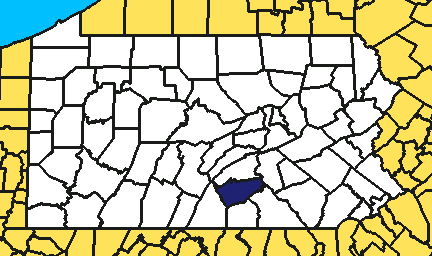LAZARUS STEWART |
|
PENNSYLVANIANS PAST AND PRESENT by Frederic A. Godcharles 1924 Contributed by Vi P. Limric vi35@epix.net LAZARUS STEWART, COMMANDER "PAXTANG BOYS" was killed in Wyoming Massacre, 3 Jul 1778. Lazerus Stewart, commander of the Paxtang Reserves and brave frontiersman, was born in Derry Twp., Lancaster County, PA., in 1734 and was killed in the terrible Wyoming Massacre, 3 Jul 1778. His parents were James and Margaret Stewart, who emigrated from Ireland to Pennsylvania in 1729. In 1775 when General Edward Braddock's expedition against the French and Indians on the Ohio River was organized, Lazerus Stewart raised and commanded and prticipated in the disastrous campaign which resulted in Braddock's defeat and death. The frontiers of Pennsylvania suffered terrible Indian incursions for years after Braddock's defeat and the situation was truly desperate. The Provincial Government in 1758 prosecuted a war against the French and Indians, and Captain Stewart commanded a company of "Rangers" detailed to guard the settlements along the Juniata river. In the engagements he exhibited such impetuous daring and vigilance that he inspired confedence in his every undertaking. The French and Indian war had been concluded but a few months when the terrible Pontiac war broke out in all its fury. The Governor of Pennsylvania was appealed to for help and protection but could give neither. The Assembly paid no attention to the applications of the distressed inhabitants, and instead of redress and aid, abused and insulted those who were sent to appeal for protection. It was under these circumstances that the "Paxtang Rangers" commanded by Captain Lazerus Stewart took matters in their own hands. On 15 October 1763, occurred the first massacre at Wyoming, when awful outrages were committed by the bloodthirsty savages under "Captain Bull." Two companies of the rangers were sent by Colonel John Elder to Wyoming, one of these was commanded by Lazerus Stewart. In December following the "Paxtang Boys" under Captain Stewart and Matthew Smith massacred the Conestoga Indians in the work house at Lancaster, for which the Provincial Government intended to punish the perpetrators of the insurrection, but upon a show of material resistance only reprimanded them. The strife at Wyoming between the Connecticut settlers and Pennsylvania gave Stewart and his rangers an opportunity to gratify their love of adventure, and to show their hostility to the Proprietary Government. In December 1769, Stewart went to Connecticut to negotiate with the Susquehanna Company. In consideration of certain lands he proposed to unite his rangers "with those of the company and effect the occupation and settlement of Wyoming. The proposition was accepted and he and his followers located in Hanover Township. On 1 Jan 1770, Stewart at the head of forty rangers marched to Wyoming and captured two garrisons of Pennsylvania that had been left at Fort Durkee. In the autumn of 1771 Captain Steward erected the first block- house in Hanover township. Here he brought his wife and here they reared their family of seven children. Captain Stewart bore a leading part in the stirring events of the Yankee-Pennsylvania Wars. On 28 Jun 1770, Governor Penn offered a reward of £300 for the apprehension of Lazerus Stewart, Zebulon Butler and Lazerus Young, three persons against whom the governor's ire was specially excited. Stewart was several times in the custody of the Provincial authorities but each time affected his escape. He was considered by Governor Penn the most dangerous man in the Province. When Col. Plunket led his expedition from Fort Augusta against the Connecticut settlers in December, 1775, Captain Stewart led the assault which resulted in the humiliating defeat of Plunket. On the day of the invasion of the Wyoming Valley by the British and their Tory and Indian allies 3 Jul 1778, Captain Stewart was in command of he Hanover Company and fell in the thickest of the fight. Stewart owned a large farm in Paxtang and had married Martha, daughter of Josiah and Elizabeth Crain Espy. They were the parents of seven children, the youngest, Martha, being born the day before the battle in which her brave father lost his life. Captain Stewart was a great hero, and a defender of the frontiersmen and of the Connecticut settlers at Wyoming. He was a prominent and efficient actor who contribued in no small degree to the protection of his neighbors. He was a practical man, sober, enterprising, brave, kind and generous. He died gloriously struggling to drive back the ruthless invaders from the soil of his native state. When the awful news was conveyed to his widow and mother, she took her seven children and a small craft and floated down the Susquehanna River to Harrisburg. After the war she returned to Wyoming where she died in 1791. Newspaper and date unknown. Copyright © 1999 Vi P. Limric |



